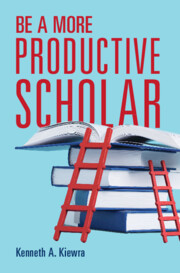Book contents
- Be a More Productive Scholar
- Be a More Productive Scholar
- Copyright page
- Contents
- Acknowledgments
- Introduction
- 1 You Can Do It
- 2 Get Solid Training
- 3 Find Your Path
- 4 Forge an Identifiable Research Program
- 5 Use Productive Research Approaches
- 6 Leverage Student Mentoring
- 7 Write Like a Star
- 8 Handle the Review Process
- 9 Manage Time and Life
- 10 Seek and Lend Support
- 11 Climb Down from the Tower
- Conclusion
- Appendix Meet the Productive Scholars
- Index
5 - Use Productive Research Approaches
Published online by Cambridge University Press: 28 March 2024
- Be a More Productive Scholar
- Be a More Productive Scholar
- Copyright page
- Contents
- Acknowledgments
- Introduction
- 1 You Can Do It
- 2 Get Solid Training
- 3 Find Your Path
- 4 Forge an Identifiable Research Program
- 5 Use Productive Research Approaches
- 6 Leverage Student Mentoring
- 7 Write Like a Star
- 8 Handle the Review Process
- 9 Manage Time and Life
- 10 Seek and Lend Support
- 11 Climb Down from the Tower
- Conclusion
- Appendix Meet the Productive Scholars
- Index
Summary
Productive scholars prioritize research and use productive research approaches. How else could some produce ten or more publications per year and hundreds over their career? Productive scholars spend about half their work days focused on research, usually preserving the morning hours for research and writing, because those are their top priority and scholars want to give them their full attention when they are most alert. Productive scholars rarely publish alone. They collaborate on nearly 90 percent of their publications. Benefits of collaboration include the division of labor, multiple viewpoints, quicker outputs, and working on several projects simultaneously. Productive scholars typically juggle a half-dozen projects or more, in various phases of completion. They often seek grants that help them do more and better research. They also find publication opportunities by occasionally mining existing data sets, conducting meta-analyses, and composing literature reviews and conceptual pieces. Their research is marked by good research questions that are feasible to carry out with simple but powerful research designs. Productive scholars are self-regulatory, carefully monitoring progress and adjusting their approach as needed. Still, they occasionally fail, as all do. They are not disheartened, knowing that failure is their catalyst and success guide.
Keywords
- Type
- Chapter
- Information
- Be a More Productive Scholar , pp. 91 - 124Publisher: Cambridge University PressPrint publication year: 2024

